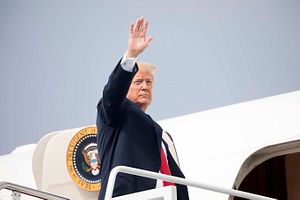While U.S. President Donald J. Trump has assured Americans that “there is no longer a Nuclear Threat from North Korea” and continues to praise North Korean dictator Kim Jong Un, the Washington Post reported Monday that satellite evidence suggests North Korea is continuing to manufacture intercontinental ballistic missiles (ICBMs). This disconnect comes from Trump not focusing on the right actions or metrics when it comes to his stated objective of denuclearization: Trump is treating all news as great news, thus putting his own U.S. negotiators at a disadvantage in the diplomatic process.
Many of North Korea’s recent gestures toward the United States have been along the lines of atmospheric confidence-building measures. It’s released three American hostages, returned the remains of 55 U.S. soldiers killed during the Korean War, and unilaterally committed to a moratorium on nuclear and missile tests. These steps are bricks that form the foundation upon which further negotiations and agreements will be built. However, a diplomatic negotiation cannot be comprised solely of confidence-building steps – there must be substantive action to make meaningful progress.
North Korea has yet to do much to address America’s core concern: the ability of North Korea to threaten the United States and its allies with weapons of mass destruction. Trump needs to ask – can North Korea produce fissile material? Is it still enriching uranium and plutonium? Can it manufacture and field nuclear-capable ICBMs? Is North Korean artillery positioned to destroy Seoul within minutes?
Instead, Trump frames every single North Korean action as major step toward denuclearization. He wants to continue the narrative that he’s solved the problem – hoping no one is paying attention to the details. Days after North Korean officials skipped a meeting about the repatriation of remains, Trump tweeted that North Korean “relationships with us are very good.” When reports of Trump’s frustration with the pace of progress surfaced, he was quick to insist that everything was hunky-dory.
If the president wants to make real progress on the Korean Peninsula, he can’t keep calling every at bat a home run. U.S. diplomats need to be empowered to evaluate and respond to North Korean actions relative to how meaningful those actions are to America and its allies’ interests. They can’t live in fear that after a series of challenging negotiations, Trump will undermine their hard work by praising Kim Jong Un and whatever the North Korea team decided to offer up that day. They can’t do their jobs if they’re worried that the president will agree to major concessions (like a summit meeting) without getting anything real in return. Trump is pulling the rug out from under his diplomatic team through his actions.
If U.S. negotiators are unable to hold North Korea accountable for a lack of progress on denuclearization or the intentional delaying of deliverables, North Korea will continue to drive the agenda by offering a steady stream of small concessions to satiate Trump while continuing to produce weapons of mass destruction. The substantive steps North Korea has taken so far, including the destruction of tunnels at Punggye-ri Nuclear Test Site and the dismantlement of the rocket test stand at Sohae Satellite Launching Station, have all been offered by North Korea and are considered easily reversible. While they’re positive steps in the right direction, North Korea is also taking advantage of Trump’s need to treat denuclearization as a done deal, and Trump is letting them.
With North Korea angling for a peace treaty, the consequences of Trump’s lack of discrimination and haste to declare “progress” could become even graver. A well-thought out, thoroughly negotiated peace treaty that goes hand-in-hand with denuclearization and civil society reform could be a welcome outcome. A rushed agreement composed solely of North Korean talking points puts the United States and its allies at risk of nuclear coercion and proliferation.
Ultimately, we can’t be certain of North Korea’s intentions. We have no way of knowing if there is any combination of acceptable concessions that will lead to the “final, fully verified denuclearization” of North Korea. Given North Korea’s track record with honoring agreements, it’s not out of the question that we won’t get to that U.S. goal. In a situation filled with so much uncertainty and such challenging odds, Washington must do everything in its power to do diplomacy right. Trump is letting America down by focusing on looking good rather than doing what is actually good.
Abby Bard is a research assistant of Asia policy for National Security and International Policy at the Center for American Progress.

































